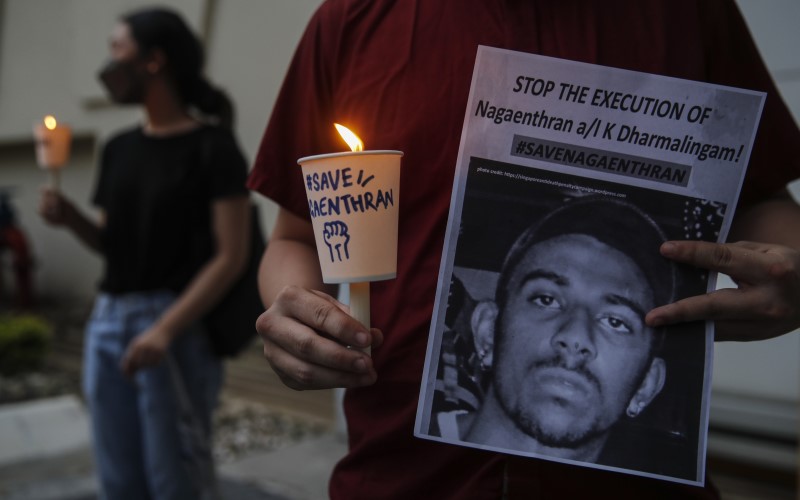Covid diagnosis delays intellectually disabled man's execution again
December 5, 2021
Diagnosed with COVID-19, a man on death row in Singapore has been given another stay of execution, allowing international outcry to grow louder.
Singapores court of appeal has adjourned the appeal it was due to hear last week that will determine whether Nagaenthran Dharmalingam, a 31-year-old intellectually impaired Malaysian man, will hang.
An earlier hearing had been adjourned and the impending execution stayed when Nagar was diagnosed with COVID-19. The latest adjournment is yet another twist to Nagars 10-year ordeal on death row.
Nagar was arrested when he was 21 for smuggling 42.72 grams of diamorphine into Singapore. He has an IQ of 69 and his defence team has argued consistently that his intellectual impairment, and associated psychological frailties, saw him exploited by international drug traffickers.
Those claims have been rejected by the courts and in statements by Singapores attorney-general.
Nagar was due to be hanged on October 28. The subsequent delays in the court hearing, which is his final avenue of appeal, have renewed hope that the international outpouring of support for Nagar, and condemnation of his death sentence, may yet prompt a presidential pardon.
The anti-death penalty activist and journalist, Kirsten Han, reports that the families of 237 other death row inmates have written recently to Singapores President Halimah Yacob pleading for Nagars life to be spared. The letter is from those who love the people Singapore has condemned to death. The #SaveNagaenthran petition organised through Change.org has 98,839 signatures.
There is a savage and incongruous irony to Covid delaying Nagars appeal. A young man with borderline intellectual functioning, and all the cognitive and psychological issues that that implies, is considered sufficiently fit and well to be executed by the state but, once he contracts COVID-19, logic, common sense and humanity prevent the execution.
It is not entirely clear what has, or has not, occurred in the few weeks since his Covid diagnosis that saw Nagars appeal hearing reinstated only to again be adjourned.
Nagars fortuitous stay of execution has allowed the international chorus of condemnation against his hanging to grow larger and louder.
The United Nations High Commissioner for Human Rights; legal bodies in Australia and across Asia; Virgin boss, Sir Richard Branson, and anti-capital punishment groups, worldwide, have all added their voices in support for Nagar.
The support for Nagar and condemnation of his death sentence is multi-faceted.
International legal experts have questioned whether the execution of a man convicted of a drug crime is a breach of international law. Other legal bodies, including LawAsia, point out that the execution may breach Singapores obligations as a signatory state to the UN Convention on the Rights of Persons with Disabilities.
The Law Council of Australia contends that it is impossible for the death penalty to avoid torture, cruel, inhuman and degrading treatment in the methods of execution and the living conditions of people on death row.
Elsewhere, opponents of the death penalty, including Branson, point out that there is no evidence, much less compelling evidence, that the death penalty acts as a deterrent for crime or has any impact on the supply of, or demand for, illicit drugs.
Recently, Ismail Sabri Yaakob, Prime Minister of Malaysia, added his voice in support of Nagar in a personal plea for mercy to his Singaporean counterpart, Lee Hsien Loong.
Pessimism surrounds Nagars final appeal. Singapores Courts have consistently rejected all arguments advanced on his behalf.
If the Court of Appeal decision follows its predecessors, Nagars only hope of staying alive is a presidential pardon. Writing for the Lowy Institute in 2018, Han points out that Singapores president acting on the advice of the Cabinet, hasnt granted a single pardon to a death row inmate since 1998.
More optimistically, much has changed in the ensuing two decades. Singapores continued adherence to the death penalty marks it increasingly as an outlier in the international community. As Amnesty International reports, the number of countries which have formally abolished the death penalty has been steadily increasing (48 in 1991 to 108 by April this year).
Importantly, Nagars home country and Singapores near neighbour, Malaysia, announced the abolition of the death penalty and a moratorium on the carrying out of existing death sentences, in 2018.
Although no new date for the hearing of Nagars appeal has emerged and it may not occur before January, there remains concern about the death machine being launched into instant action. There is a growing fear among Nagars family and supporters that his execution will mirror the extraordinary speed with which Jabing Kho was killed in 2016. Han recounts that Khos lawyer was told to file his notice of appeal by 11pm with the final appeal to be heard the next morning. The appeal was dismissed at the hearing and Kho was hanged that afternoon.
The BBCs Yvette Tan reports that Nagars family are praying for a miracle. Her sister Sarmila told her: “When I’m alone and I think of my brother, there is pain. But [we need to] be brave and keep on praying anything can happen.”
Time is short, but it hasnt yet run out for Nagar.

